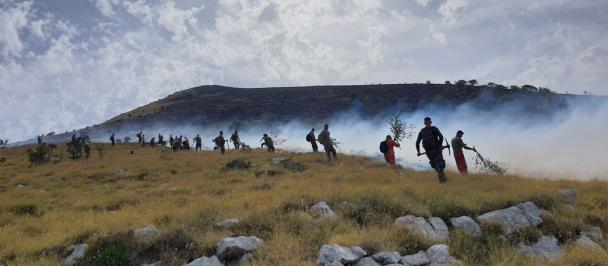Prokoško Lake on Mount Vranica, near Fojnica, could once again become home to the alpine newt, a mysterious amphibian that once inhabited the banks of the lake.
Newt Come Home
July 26, 2023

Thousands of tourists pass along the macadam road from the Municipality of Fojnica towards Mount Vranica. Their final destination is Prokoško Lake, located in the center of the livestock farming village at over 1,600 meters above sea level. Once a peaceful place, today, it is teeming with nature lovers from all over the world, as well as with new settlers who are building holiday cottages on the banks of the glacial lake.
However, behind the inspiring natural beauty lies a not-so-beautiful story about the extinction of the Bosnian alpine newt (Triturus Alpestris Reiseri), a stenoendemic amphibian for which Prokoško Lake was once the largest and only habitat.
Massive expansion of construction, problems with sewage and water supply, organic waste and uncontrolled stocking of the lake with the various species of fish have all disturbed the natural balance in this area. Instead of rare, orange-bellied amphibians, only large shoals of fish can be seen in Prokoško Lake today.
Herpetologist Adnan Zimić, who has been researching amphibians for many years, says that the biodiversity of the lake has been largely disrupted due to the peak of pressure from the fish. Initial research conducted as part of the Sustainability of Protected Areas (SPA) project, implemented by UNDP BiH and financed by the Global Environment Facility (GEF), showed that no species of invertebrates are present in Prokoško Lake, not even common toad tadpoles, which normally tolerate the presence of fish.
“Preliminary field research indicates very alarming and devastating data, on the basis of which we can now definitively claim that the once largest and most numerous subpopulation of the Bosnian alpine newt has gone extinct from Prokoško Lake. The coastal zone where the newt once lived is now occupied by the common minnows and gudgeons, the fish communities with an extremely large number of individuals in the population”, Zimić explained.
According to experts, only destocking of the lake can have a long-term impact on the return of newts to Prokoško Lake. Therefore, as part of the SPA project, their intention is to improve the stability and state of the newt population in this area, which will also mean harvesting fish from the lake.
“It is through this project that interest has been shown for the first time in both Prokoško Lake and the critically endangered newt. This is also the first time we have a preliminary insight into the relative sizes of subpopulations, their habitats and levels of threat, which is the initial step in protecting the species”, said Zimić.
On the other hand, ichthyologist Adem Hamzić explains that the true state of biodiversity in the lake will be determined through ichthyological field research, planned for the spring, summer and fall of 2024. This research will reveal the species of fish that live in Prokoško Lake.
“It is assumed that all these fish are carnivores, which is the reason why they cause great damage to newts by eating newt eggs, larvae, and adults. During the research, food chains will be established based on the contents of the fish’s gastrointestinal tract, and then all species will be harvested with an electric generator. All surviving fish will be transferred to other localities in the area of Fojnica”, said Hamzić.

Herpetologist Zimić adds that it will be necessary to protect also amphibians that now live outside their natural habitat, in captivity, as he puts it. This will entail the relocation of endangered species to smaller, isolated areas, equipped for their protection and reproduction, which will serve for the development of a new population of newts in the event of their extinction in Prokoško Lake.
“After we remove the fish from the lake, the assumption is that the newts will migrate to the lake on their own and that in two to three years they will have created a viable population. Science has shown that in practice, there is a rapid self-renewal of the amphibian community after the removal of the indigenous fish from the high mountain lakes”, Zimić explained.
Institutions at the level of the Federation of Bosnia and Herzegovina have also recognized the importance of preserving Prokoško Lake, which was declared a protected area in 2006 and classified as category IIIb: A Natural Monument or Feature. The Ministry of the Environment and Tourism of the Federation of Bosnia and Herzegovina, as one of the implementing partners of the SPA project, carries out strategic and continuous activities dedicated to the protection of Prokoško Lake.
The Head of the Ministry's Department for Nature Protection, Zineta Mujaković, believes that many different factors have contributed to the destruction of nature around Prokoško Lake and endangering the habitat of newts.
“Through carelessness, man causes the greatest damage to nature, including this area. Also, the sewage system has not yet been solved by the municipal authorities and as such, it significantly affects the lake itself”, said Mujaković, emphasizing the significant contribution of UNDP and the United Nations Environment Programme (UNEP) to the protection of biological diversity and the preservation of ecosystem services in BiH, as well as that the projects financed by the GEF are managed by this Ministry, accordingly adapted and directed to the needs of our country.
“We expect that the Sustainability of Protected Areas project will particularly contribute to combating climate change, which has a major impact on biological diversity in protected areas - the component of this project, introduced for the first time”, adds Mujaković.
The main goal of the five-year SPA project, implemented by the UNDP in cooperation with partner institutions in the country, and financed by the GEF, is to ensure a better status of biodiversity by strengthening resilience to the impact of climate change and achieving financial sustainability of protected areas in Bosnia and Herzegovina.

 Locations
Locations









